28 Oct 2014 | Draw the Line, Europe and Central Asia, Events, United Kingdom
Index on Censorship held its latest Draw the Line workshop with the young associates of Ovalhouse theatre in south London. The young associates are the theatre’s steering group for the national Truth about Youth initiative, which aims to challenge and change negative perceptions about young people, by supporting projects which enable them to work with adults, the media and the wider community. The group individually explored different freedom of expression issues before examining this month’s question “Do laws restrict or protect free speech?” in more detail as a group.
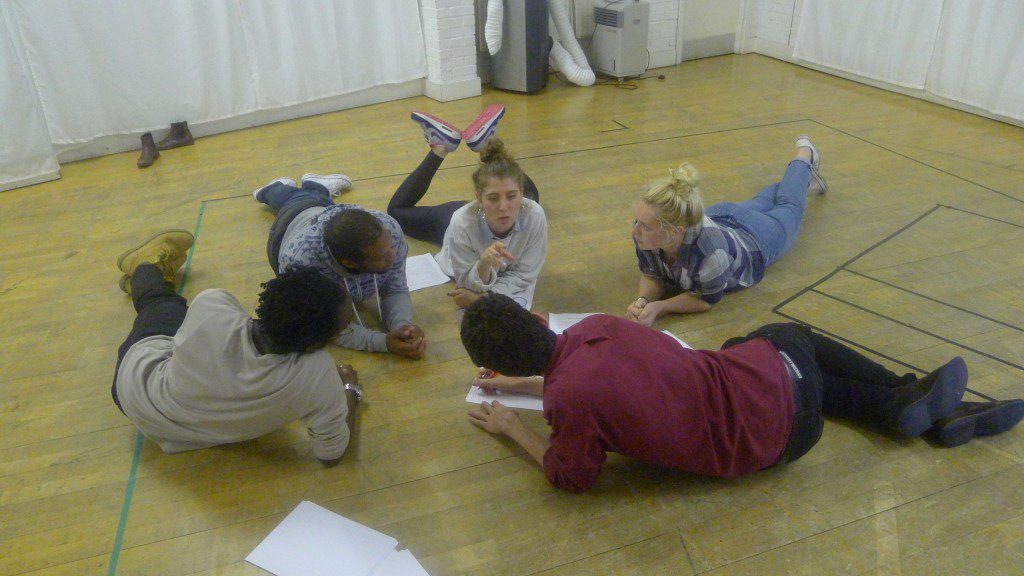
Young Associate Jordan Mitchell shares his experience of the workshop:
Going into the freedom of expression workshop, I had a couple of questions in mind; who defines freedom? Does freedom mean something different to each person? And how do we draw the line between free expression and infringing on another person’s freedom and sense of self? As a young associate, my colleagues and I are actively involved in the community, and one of the things we encourage and are encouraged to do ourselves is to appreciate different opinions, and respect that everyone has the right to that opinion.
The exercises were informative and engaging, particularly the “belief scale” (this involves being given a statement and having to answer how far you agree/disagree by positioning yourself on an invisible line across the room with either end representing “agree” or “disagree”). Often the questions posed to us led to a spread across the scale, which showed how varied opinions can be, even in a group containing people with similar interests. The great thing about it was that the reasoning put forward by people was incisive, and even if my view didn’t change, I understood and accepted that point of view.
One thing was reaffirmed in my mind at the end. Freedom of expression is limited dependent on who you know. Influence plays a big part, and tying in with the work that we do as young associates, something has to be done to build more platforms for people to be heard.
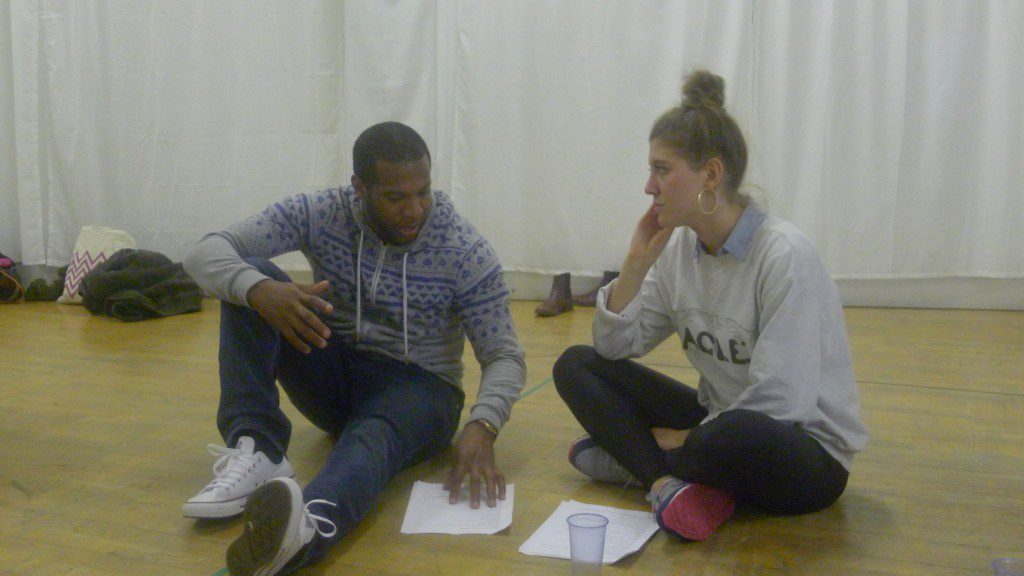
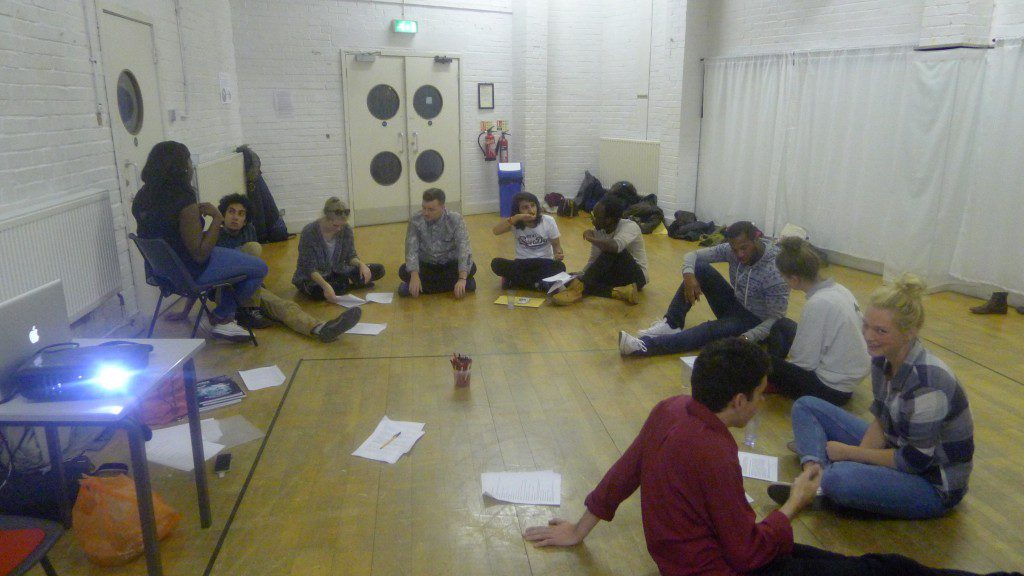
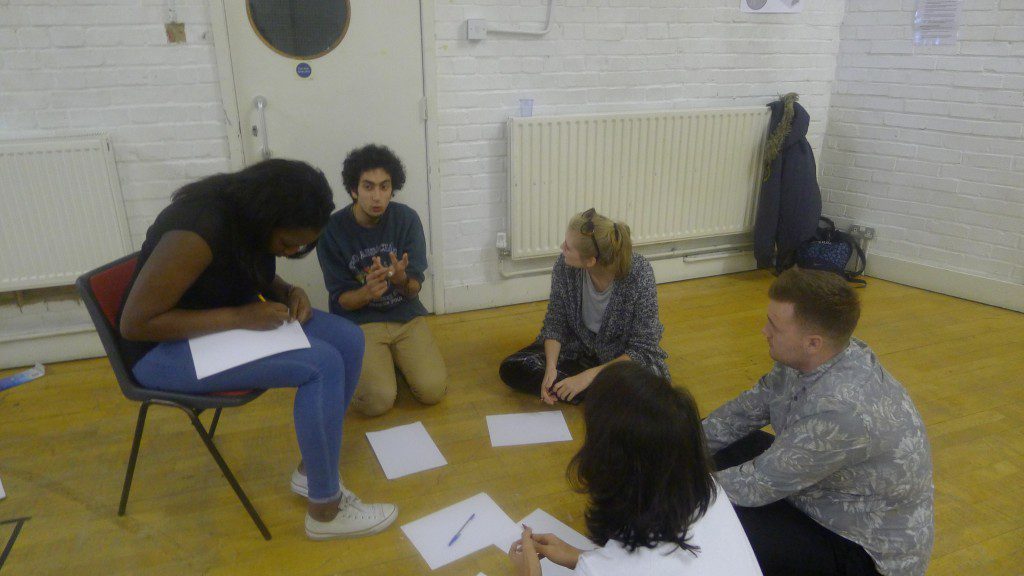
This article was originally posted on 28 October at indexoncensorship.org
8 May 2014 | Europe and Central Asia, News and features

Eurovision contestant Teo, in the music video for this year’s Belarusian entry Cheesecake (Image: Yury Dobrov/YouTube)
If you want a Eurovision of the future, imagine a faux-dubstep bassline dropping on a human falsetto, forever. That was how it felt watching YouTube footage of this year’s entrants in the continent’s greatest song-and-dance-spectacle.
The Eurovision Song Contest, born of the same hope for the future and fear of the past as the European Union, is approaching its 50th year. And strangely, it’s doing quite well. In spite of fears that the competition would end up as an annual carve up between former Soviet states, recent years have in fact seen a fairly equal spread of winners throughout the member states of the European Broadcasting Union (who do not actually have to be in Europe; a fact often missed by anti-Zionists who somehow see a conspiracy in the fact that Israel is a regular entrant in the competition is that channels in countries such as Libya, Jordan and Morocco are also members of the EBU, and technically could enter if they wish. Morocco did, in 1980). Since 2000, the spread of winners between Western Europe, the former Soviet states, and the Balkans and Turkey have been pretty much even.
While some of the geopolitics will always be with us — Turkey and Azerbaijan united in their hatred of Armenia, Cyprus and Greece douze-pointsing each other at every opportunity — the once-derided contest has in fact functioned as a genuine competition. Year in, year out, the best song in the competition tends to win, while the laziest entrants, not taking the event seriously as a songwriting competition (yes, we’re looking at you, Britain), tend to fall behind and then complain that Europe doesn’t “get” pop music.
The best songs and singers triumph, by and large. But Eurovision still does have a political edge.
Take Tuesday’s semi-final in Copenhagen. Russia’s entry, Shine, performed by the Tolmachevy Sisters and described by Popbitch as sounding like “almost every Eurovision song you’ve ever imagined” contained some unintentionally ominous lines:
Living on the edge / closer to the crime / cross the line a step at a time
Add an “a” to the end of that “crime”, and you’ve got the Kremlin’s current foreign policy neatly summed up in a single stanza.
I am not suggesting that the Tolmachevys were sent out to justify Putin’s expansionism. Nonetheless, the Copenhagen crowd were keen that Russia should know what the world thought of its foreign policy and domestic human rights record: as it was announced that Russia had made Saturday’s grand final, the arena erupted in jeering. The dedicated Eurovision fan is clearly not just a poppet living in a fantasy world of camp. They are engaged with the world, and particularly the regressive policies of countries such as Russia, Azerbaijan and Belarus, perhaps more so than your average European.
When Sweden’s Loreen won the competition in Baku, capital of Azerbaijan, in 2012, she pledged to meet the country’s human rights activists. That same year, BBC commentator “Doctor Eurovision” (he actually is a doctor of Eurovision) made explicit references to Belarus’s disgraceful dictatorship, rather than simply giggle at the funny eastern Europeans.
This raises an interesting question about how we engage with dubious regimes.
Before the Baku Eurovision in 2012, there was some discussion over whether democratic countries should boycott the competition, sending a message to Aliyev’s regime.
“No,” Azerbaijani civil rights activists told Index on Censorship. “Let the world come and see Azerbaijan.” They felt that for most of the world, most of the time, they are citizens of a far away country of whom we know nothing. They wanted to take their chance while the world was looking. I think they got it right. As discussed last week, Azerbaijan is engaged in a massive international PR campaign, but to most people in the world since that Eurovision and the attention it raised for the country’s opposition, it has not been able to entirely disguise its atrocious record on free speech and other rights.
On Friday, the International Ice Hockey Federation’s world championship will open in Belarus. Though there was some discussion of boycotting that event, it has died down. Nonetheless, journalists from Europe and North America will be covering the event, and fans will travel too.
Belarus’s macho dictator Alexander Lukashenko is a keen ice hockey fan, and will be aiming to sweep up the glory of hosting a major international sporting event, not long after the country hosted the world track cycling championships in 2013.
Ice hockey fans and sports journalists are generally not the type of people who go in for Eurovision. But maybe they should try to take a leaf out of the Song Contest supporters book. Have a look at the country around them, learn a little about the politics, and spread the word about the side the dictators don’t want us to see.
Autocrats try to use these international competitions to control the world’s view of them. We should beat them at their own games.
This article was posted on May 8, 2014 at indexoncensorship.org
24 Apr 2014 | Lebanon, News and features, Religion and Culture, Young Writers / Artists Programme
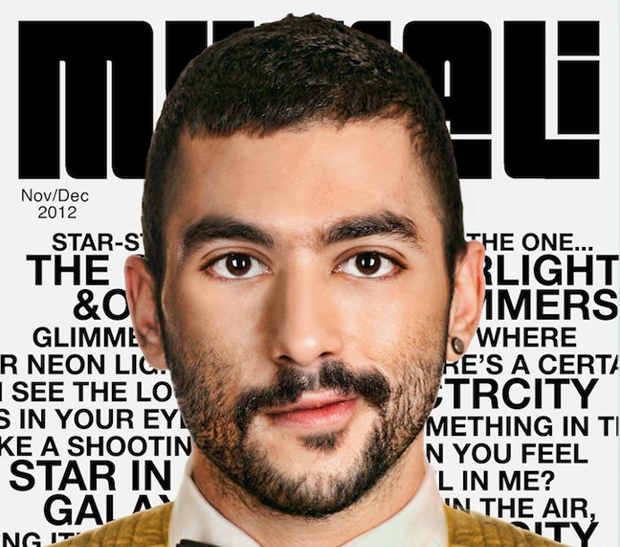
Hamed Sinno, who is openly gay, is the lead singer of Mashrou’ Leila
While walking the streets of the upscale downtown district of Beirut, or sipping cocktails in one of El-Hamra’s bustling bars, one could easily forget that Lebanon is a country where civil liberties are still in debate.
Article 534 of the Lebanese penal code states: “Any sexual intercourse contrary to the order of nature is punished by imprisonment for up to one year.” The vaguely worded article has and is still being used to crackdown on the LGBT community in Lebanon. Compared to its neighbours in the Middle East, Lebanon has long been considered one of the least conservative countries in the region. According to a poll conducted by the Pew Research Centre in 2013, 18% of the Lebanese population thinks that homosexuality should be accepted in the society, putting it way ahead of Egypt, Jordan and Tunisia where almost 97% of the population views homosexuality as deviant and unnatural.
The Lebanese Psychiatric Society issued a statement in early 2013 saying that: “The assumption that homosexuality is a result of disturbances in the family dynamic or unbalanced psychological development is based on wrong information” — making Lebanon the first Arab country to dismiss the belief that homosexuality is a mental disorder. On 28 January 2014, Judge Naji El Dahdah of Jdeideh Court in Beirut dismissed a claim against a transgender woman accused of having a same-sex relationship with a man, stating that a person’s gender should not simply be based on their personal status registry document, but also on their outward physical appearance and self-perception. The ruling relied on a 2009 landmark decision by Judge Mounir Suleimanfrom the Batroun Court that consenual relations can not be deemed unnatural. “Man is part of nature and is one of its elements, so it cannot be said that any one of his practices or any one of his behaviours goes against nature, even if it is criminal behaviour, because it is nature’s ruling,” stated Suleiman.
Despite the recent positives, being gay in Lebanon is still a taboo. In a country drenched in sectarianism, debates about homosexuality are easily dismissed in the name of religion and homosexuals are accused of promoting debauchery.
“People in Lebanon, and across the region, still act like homosexuality doesn’t exist in our society,” said Kareem, who requested that Index only use his first name. “I think it’s important that we start the conversation and get the issues out in the open, so people can start acknowledging it and then decide their stance on. The fight for our rights comes later on,” he added.
In 2013, Antoine Chakhtoura, mayor of the Beirut suburb of Dekwaneh, ordered security forces to raid and shut-down Ghost, a gay-friendly nightclub. “We fought battles and defended our land and honor, not to have people come here and engage in such practices in my municipality,” the mayor asserted.
Four people were arrested during the raid and brought back to municipal headquarters where they were subject to both physical and verbal harassment: forced to undress, enact intimate acts which included kissing, as well as being violently beaten. Marwan Cherbel, minister of interior at the time of the incident, backed the mayor’s actions, adding that: “Lebanon is opposed to homosexuality, and according to Lebanese law it is a criminal offence.”
Unfortunately, this was not an isolated incident. In a similar raid on a movie theatre in the municipality of Burj Hammoud known to cater for a gay clientele, 36 men were arrested and forced to undergo the now abolished anal probes — known as tests of shame. The raid came only a few months after Lebanese TV host Joe Maalouf dedicated an episode of his show Enta Horr (You’re Free) to exposing a porn cinema in Tripoli where it was claimed that young boys were being sexually abused by older men.
“The fact that these incidents received a lot of media coverage, some of which denounced the raids, is a sign that the public is little by little taking an interest in the issue of gay rights,” said Kareem. “Five or six years ago, this could have easily gone unnoticed. While the gay community might not be fully accepted or tolerated in Lebanon, it has been gaining a lot more visibility in recent years.”
Helem, a Beirut-based NGO, was established in 2004 to be the first organisation in the Middle East and Arab world to advocate for LGBT rights. In addition to campaigning for the repeal of Article 543, Helem offers a number of services, including legal and medical support to members of the LGBT community. Organisations like Helem and its offshoot Meem, a support group for lesbian women, had a huge impact on raising awareness and correcting misconceptions about homosexuality. Support from Lebanese public figures has also been on the rise in recent years. For example, popular TV host Paula Yacoubian and pop star Elissa have both shown support for the LGBT community in Lebanon via their Twitter accounts.
While the struggle to change the law continues, young artists have been challenging social norms through art. Mashrou’ Leila, a Beirut-based indie rock band, has sparked a lot of controversy thanks to their songs, in which they unapologetically sing about sex, politics, religion and homosexuality in Lebanon. In Shim el Yasmine, the band’s lead singer, Hamed Sinno, who is openly gay, sings about an old love, a man whom he wanted to introduce to his family and be his housewife. Director and art critic, Roy Dib, recently won the Teddy Award for best short film in 2014 at the 64th Berlinale International Film Festival with his film Mondial 2010. The film tells the story of a gay Lebanese couple on the road to a holiday weekend in Ramallah, Palestine. It tries to explore the boundaries that make it impossible for a Lebanese person to go into Palestine, as well as the challenges faced by a homosexual couple in the region.
The battle for gay rights in Lebanon is multilayered, and while change is starting to feel tangible, there is still a lot to be done.
This article was originally posted on 24 April 2014 at indexoncensorship.org
13 Feb 2014 | Iraq, News and features, Politics and Society
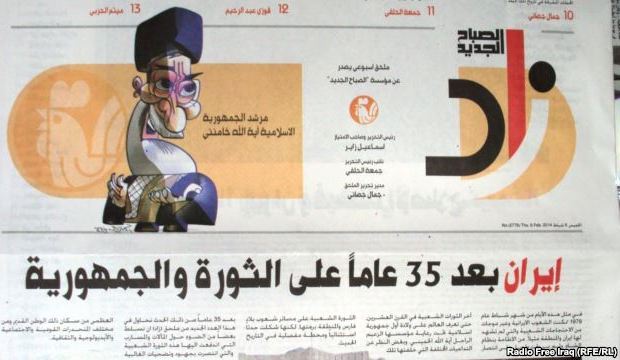
Al-sabah al jadeed’s caricature of Ayatollah Khamenei (Image RFE/RL)
Independent Iraqi daily newspaper Al-Sabah Al-Jadeed has survived numerous attempts to destroy it over its 10 year existence. But on 10 February, the newspaper’s Baghdad office was bombed and now its future is in doubt. The daily may need to find a new office, employees are fleeing, and its website is facing one DoS attack after another.
Windows, furniture and equipment were damaged when a bomb went in front of the building at 4.30 am. Later that morning another bomb exploded not far from the newspaper, while an unexploded heavy C4 plastic explosive device was found inside the premises and dismantled by police. No one was injured or killed, as the office was empty – but some neighbours are suggesting that the newspaper should move.
A few hours later that same day a militia-like group entered the building. “They came threatening us in broad daylight, so to speak,” says Ismael Zayer, editor in chief. The group escaped after employees managed to warn the police.
The bomb attacks followed a social media campaign to demand the closure of the newspaper after it published its weekly supplement Zad on 6 February. The supplement was devoted to the 35th anniversary of the Islamic Revolution in Iran and on the cover featured a caricature of Iran’s supreme leader, Ayatollah Ali Khamenei. The cover caricature is a tradition for Zad, a supplement that came into existence in the first months of the Arab Spring. Ahmed al-Rubaie, the newspaper’s cartoonist, has drawn hundreds of caricatures of political and religious figures, from Iraqi president Jalal Talabani, Najaf’s grand ayatollah Al-Sistani and prime minister Nouri al-Maliki to Nelson Mandela and other internationally known figures. These cartoons are never intended to be offensive or convey a negative message, they are just an alternative to uninteresting photos of VIPs.
Zayer believes the caricature of Khamenei is just a pretext to attack the newspaper and have it closed before the parliamentary elections planned for this spring. But there may be yet more reasons for the attacks and threats against the newspaper. Al-Sabah Al-Jadeed recently covered a damning report by Human Rights Watch on the abuse of female detainees in Iraqi prisons. HRW accused the government of illegally detaining wives and daughters of (Sunni) suspects who are on the run, claiming detainees were sexually abused. Zayer wrote an open letter to the government, demanding that the Minister of Justice, Hassan al-Shimmari, be sacked. “I am ashamed of my country,” he commented, “What are we? A whorehouse?”
After some efforts to convince the Ministry of Interior to protect the newspaper and its staff, the office of the newspaper is now under permanent surveillance by the police, but it is unclear for how long. Zayer has left the country temporarily after receiving death threats. This is not the first time the editor has been forced to flee Baghdad.
In the beginning of 2006 when Iraq’s sectarian conflict led to thousands of assassinations a month, Zayer managed the newspaper from a small office in Amman, Jordan. He planned to create an international edition for the millions of Iraqi refugees outside their home country – a project that was almost ready to be launched when on 30 December, Saddam Hussein was hanged in a way that scandalised his Jordanian supporters and made the company that was going to produce the international edition wary of printing a newspaper critical of Ba’athists.
Zayer decided to open a second bureau in Erbil, the relatively safe capital of the autonomous Kurdish Region, and to bring back around a dozen journalists that had escaped to neighbouring Jordan, Lebanon and Syria. The bureau was maintained until the very end of 2009, when Zayer and most of his staff went back to Baghdad.
The newspaper has faced many other challenges. In May 2004, Zayer’s driver and bodyguard were killed during an attempt by fake police to kidnap the editor in chief. Later, one of Zayer’s brothers was kidnapped for a hefty ransom. More than once ministers ordered an advertising boycott – a large part of the advertising in the newspaper concerns government tenders, next to a steady stream of ads by mobile phone companies and real estate firms. Nowadays, a strange rule is in force that says tender ads can only be paid once the tender has been decided – as a result, the newspaper is sitting on hundreds of unpaid bills.
From 2006 until 2008, when Nouri al-Maliki, after having been under siege in Basra himself, finally decided to defeat the Shi’ite militias in the south and the capital, distribution of the newspaper was often prohibited in many cities and Baghdadi neighbourhoods. Distribution north of the capital was completely disrupted during the American siege of Fallujah at the end of 2004 – and for a long time thereafter. The Borsa in Baghdad, a building from where for years, several independent and party newspapers were sold to traders every morning, was occupied for months by Ba’athists. Sometimes printing houses ran out of paper after trucks were stolen on the road from Amman to Baghdad and their drivers killed.
By attempting to create a modern, democratic trade union for journalists, Zayer, who was elected its first president, ran into serious trouble with the old union, one of the many Ba’athist institutions the US occupation’s administration had left intact.
The newspaper has survived several libel cases brought on by various politicians demanding potentially ruinous compensation sums, owing its victories to courageous independent judges. It has survived vicious campaigns on the internet claiming it is in “American-Zionist” hands. Recently it survived the flooding of large parts of Baghdad, as a result of bad maintenance of the sewage system and torrential rain.
Iraqi readers have shown their support for the newspaper after the bomb attack. This February is not the first time there is no Al-Sabah Al-Jadeed in the streets – but this time, as those responsible for the bomb attack didn’t leave a business card, with whom should the newspaper negotiate? Removing the supplement from the website hasn’t helped to assuage the anger about the innocent caricature of Khamenei. In the past the newspaper could hang on thanks to financial help from donors, as well as political support from Iraqi ministers and top officials who think independent media are at least a necessary evil. It certainly needs solidarity now.
This article was published on 13 February 2014 at indexoncensorship.org







